“Perimenopause and menopause should be diagnosed
without laboratory tests in otherwise healthy women aged
over 45 years, on the basis of vasomotor symptoms…”.1
Umbrella
What may the Menopause Diagnosis Umbrella include?
Depending on the Source (DotS) this Umbrella may include:
- Menopause Confirmation
- Menopause Diagnosis
- Menopause Test
- Perimenopause Diagnosis
- Perimenopause Test
Predict
 What is the best way to predict menopause?
What is the best way to predict menopause?
In What Is Perimenopause and Menopause? Diagnosing Perimenopause and Menopause the (Australian) Jean Hailes for Women’s Health (JH) explain:
“The best way to predict menopause is to keep track of your symptoms. If your periods are irregular and your symptoms are getting worse, it’s likely you are approaching menopause”.2
Blood Tests
Is it standard practice to measure hormone levels to diagnose perimenopause or menopause?
In What Is Perimenopause and Menopause? Diagnosing Perimenopause and Menopause: Blood Tests To Diagnose Menopause the JH explain:
If you’re younger than 45 years and your periods are irregular or have stopped, your doctor might measure your hormone levels to understand what might be causing this change”.3
Follicle Stimulating Hormone Test Reliability
How reliable is a single FSH test to diagnosed perimenopause or menopause?
In What Is Menopause? How Is Menopause Diagnosed? the Australasian Menopause Society (AMS) note:
“Measurement of FSH to diagnose perimenopause or menopause is not usually indicated. A single hormone test, such as a measurement of elevated follicle-stimulating hormone (FSH) is not a reliable indicator of the perimenopause, as women’s hormone levels may fluctuate from day to day”.4
Follicle Stimulating Hormone Test Validity
What can compromise the validity of FSH tests?
In Diagnosing Menopause: Symptom Assessment and Diagnosis At Perimenopause and Menopause the AMS also note:
“It is especially unhelpful to do hormone blood tests while women are on MHT/OCP – symptoms, not blood levels, guide therapy”.5
What is MHT?
MHT can be an abbreviation for Menopause Hormone Therapy (MHT), otherwise known as Hormone Replacement Therapy (HRT) or Hormone Therapy (HT).
What is OCP?
OCP can be an abbreviation for Oral Contraceptive Pill, otherwise known as “The Pill” or birth control pills.
Over-the-Counter FSH Test
What may over-the-counter FSH tests check?
In Menopause: Menopause Diagnosis & Treatment – Diagnosis the (United States) Mayo Clinic elaborate on:
But FSH levels rise and fall during your menstrual cycle. So home FSH tests can’t really tell you whether you’re in menopause”.6
Diagnosis
How are perimenopause and menopause diagnosed?
In What Is Perimenopause and Menopause? Diagnosing Perimenopause and Menopause the JH explain:
“Ask your doctor to check if you are perimenopausal or have reached menopause. If you are at the expected age, have experienced some symptoms and have irregular periods, it’s likely you are perimenopausal. If you haven’t had a period for 12 months, you have probably reached menopause”.7
On page one in Diagnostic Tests for Menopause the European Menopause and Andropause Society note:
“Perimenopause and menopause should be diagnosed without laboratory tests in otherwise healthy women aged over 45 years, on the basis of vasomotor symptoms, irregular periods and amenorrhea”.8
In Diagnosing Menopause: Key Points the AMS explain:

- “Perimenopause is usually diagnosed clinically on the basis of new onset vasomotor or other symptoms and a change in the pattern of menstrual bleeding. Menopause is diagnosed 12 months after the final menstrual period”.9
What are vasomotor symptoms?
DotS the definition of vasomotor symptoms may vary. The Menopause Society’s (formerly The North American Menopause Society) definition is:
“Vasomotor symptoms. Also known as hot flashes and night sweats, common symptoms during perimenopause and early postmenopause”.10
In Diagnosing Menopause: Symptom Assessment and Diagnosis At Perimenopause and Menopause the AMS elaborate on:
“Many women come to the consultation expecting a blood test to diagnose menopause, and it is important to explain to them why we use the symptom score rather than a blood test in establishing a diagnosis. It is important to explain to women that the blood tests of FSH/oestradiol can fluctuate on a daily basis and therefore are not useful or necessary”.11
Symptom Score
What is the Symptom Score used by the AMS?
In Diagnosing Menopause: Symptom Score Sheet the AMS include a Symptom Score (Modified Greene Scale) and explain:
Early Menopause and POI
When may FSH assessment be indicated?
On page four in the European Menopause and Andropause Society Consensus Statement Menopause, Wellbeing and Health: A Care Pathway From the European Menopause and Andropause Society: 3. Investigations and Assessment of Ovarian Reserve 3.1 Endocrine Investigations 3.1.1 Follicle-Stimulating Hormone, published 12 May 2022, Lambrinoudaki et al. note:
“Measurement of serum concentrations of follicle-stimulating hormone (FSH) is not required for formal confirmation of menopausal stage for women over the age of 45. FSH assessment is indicated in women aged 40–45 years who report a change in their menstrual cycle and menopausal symptoms. Women aged <40 years in whom menopause is suspected should be assessed to explore possible POI”.13
What is POI?
POI in this context, is an abbreviation for Premature Ovarian Insufficiency.
In What Is Menopause? How Is Menopause Diagnosed? the AMS note:
“Measurement of FSH to diagnose perimenopause or menopause is not usually indicated. A single hormone test, such as a measurement of elevated follicle-stimulating hormone (FSH) is not a reliable indicator of the perimenopause, as women’s hormone levels may fluctuate from day to day. However, investigations may be required in certain cases including: (i) if the woman has had a hysterectomy; (ii) concern that symptoms may be due to illness (e.g., thyroid disorder rather than 8natural ageing); or (iii) if woman is under 45 years of age”.14
Health Care Provider
What if I would like to find out if I am perimenopausal or not?
If you would like to find out if you are perimenopausal or not, it may be in your best interest to choose to talk to your health care provider about this. Together you can clarify your symptoms, discuss your options and if required, agree on who may be the most appropriate health care provider to help you.
In What Is Perimenopause and Menopause? When To See Your Doctor the JH also note:
- Irregular periods
- Heavy bleeding
- Bleeding after menopause
- Increased premenstrual syndrome (PMS) symptoms
- Menopausal symptoms, such as hot flushes, that interfere with your daily life”.15
Health Topics A-Z
Where may I find Health Topics A-Z related to Menopause Diagnosis?
In Health Topics A-Z you may find:
Links
Where may I find Links related to Menopause Diagnosis?
Your Country may have Links similar to:
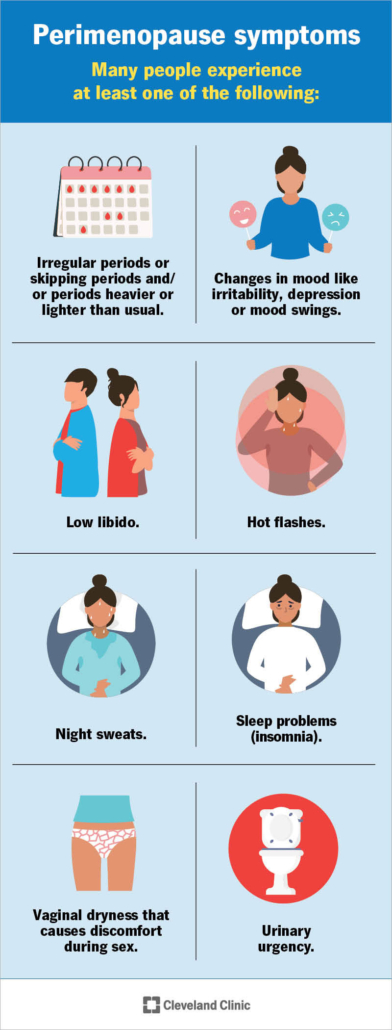
Links
This Links List to third party websites is neither comprehensive nor exhaustive. Inclusion on this Links List does not imply endorsement or recommendation. Non-inclusion on this Links List does not imply non-endorsement or non-recommendation. Third party websites are not under the control of Meno Martha International Menopause Directory. Third party websites may contain explicit medical images and/or sexual references. Please read Meno Martha International Menopause Directory’s Links Policy before proceeding to a Link. Please contact Webmaster if you experience a problem with a Link.New or Updated
- 29 Perimenopause Symptoms You May Not Know About [14 July 2025]
- Could It Be Perimenopause? How Hormones Influence the Brain [28 October 2025]
- International Menopause Society (IMS) Recommendations and Key Messages on Women’s Midlife Health and Menopause [23 December 2025]
- Perimenopause With Dr. Heather Hirsch [19 December 2025]
- What Is the Difference Between Perimenopause, Menopause and Postmenopause? [22 April 2025]
- 29 Perimenopause Symptoms You May Not Know About
- ACOG Explains: Managing Menopause Symptoms [American College of Obstetricians and Gynecologists]
- AMS Symptom Score Card
- Anti-Müllerian Hormone for the Diagnosis and Prediction of Menopause: A Systematic Review
- Askearlymenopause.org [Ask EM] [+ Video: What Is Early Menopause?]
- At-Home Menopause Tests: Pros and Cons, What They Test and When To See A Provider
- Bioidentical Hormones: Are They Safer?
- Complementary & Alternative Therapies: Non-Hormonal Treatments for Menopause Symptoms
- Complementary Medicines and Therapies for Hot Flushes
- Complementary Medicines and Therapies: Options for Menopausal Symptoms
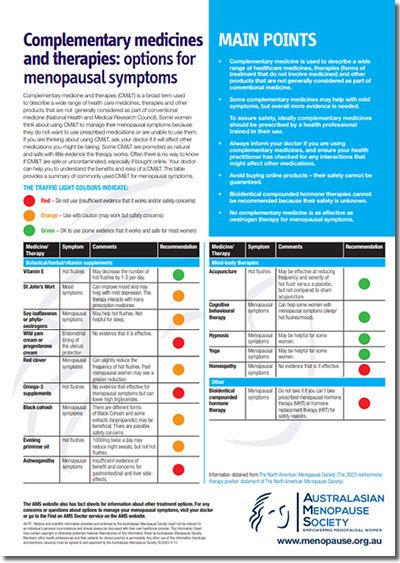
- Consumer Video and Podcast Series: 2024 Consumer Videos and Podcasts – Preparing for Your Menopause Health Care Visit
- Consumer Video and Podcast Series: 2025 Consumer Videos and Podcasts – Three Symptoms Linked To Cognitive Complaints
- Contraception and the Menopause
- Could It Be Perimenopause? How Hormones Influence the Brain
- Deciding About Hormone Therapy Use
- Diagnosing Menopause
- Diagnosing Menopause: Symptom Score (Modified Greene Scale)
- Diagnostic Tests for Menopause
- Do Menopause Testing Kits Work?
- Does Having Hot Flashes Mean I’ve Started Menopause?
- EMAS On-Demand Webinars [European Menopause and Andropause Society] [Multiply Languages]: Impact of Estrogen Deficiency on Quality of Life In Asia and the Role of Continuous Combined MHT In Treatment (EN)
- Experts Answer Your Menopause Questions In New Video
- Everything You Need To Know About Perimenopause
- Find A Menopause Practitioner [United States and Other]
- Find A Practitioner [Australasian Menopause Society i.e. Australia and New Zealand]
- Find Your Nearest BMS Menopause Specialist [British Menopause Society]
- First Symptoms of Menopause
- Follicle-Stimulating Hormone (FSH) Levels Test
- Genitourinary Syndrome of Menopause
- HRT Is Not #contraception and So If You Are Perimenopausal Then Added Contraception Is Needed
- HRT Questions Answered
- Handling Hot Flushes and Night Sweats| Dr Louise Newson
- Home Menopause Tests Measure Hormones, but Are They Helpful?
- Hot Flashes
- How To Talk To Your Doctor About Menopause

- How To Talk To Your Doctor About Midlife Brain Fog
- How Vaginal Hormones Can Transform the Health of Women
- International Menopause Society (IMS) Recommendations and Key Messages on Women’s Midlife Health and Menopause
- Is An At-Home Menopause Test Useful for Women? Experts Weigh In
- Joint Position Statement By the British Menopause Society, Royal College of Obstetricians and Gynaecologists and Society for Endocrinology on Best Practice Recommendations for the Care of Women Experiencing the Menopause
- Later Years (Around 50 Years and Over): Menopause and Post Menopause Health – Menopause [+ Video: Menopause]
- Later Years (Around 50 Years and Over): Menopause and Post Menopause Health – Signs and Symptoms of Menopause [+ Video: Talking Menopause With Your GP]
- Let’s Talk About Perimenopause
- Luteinizing Hormone (LH) Blood Test
- Luteinizing Hormone (LH) Levels Test
- Managing Menopause Symptoms [+ Video Courtesy: Mayo Clinic News Network]
- Mastering Midlife Mood Changes With Marlene Freeman, MD
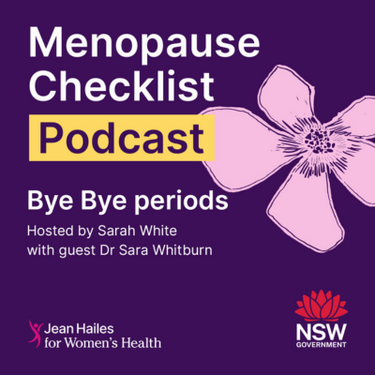 Mayo Clinic Minute: How Lifestyle Changes May Help Manage Menopause Symptoms [+ Video]
Mayo Clinic Minute: How Lifestyle Changes May Help Manage Menopause Symptoms [+ Video]- Mayo Clinic Q and A: Perimenopause Transitions and Concerns
- Menopause
- Menopause
- Menopause

- Menopause
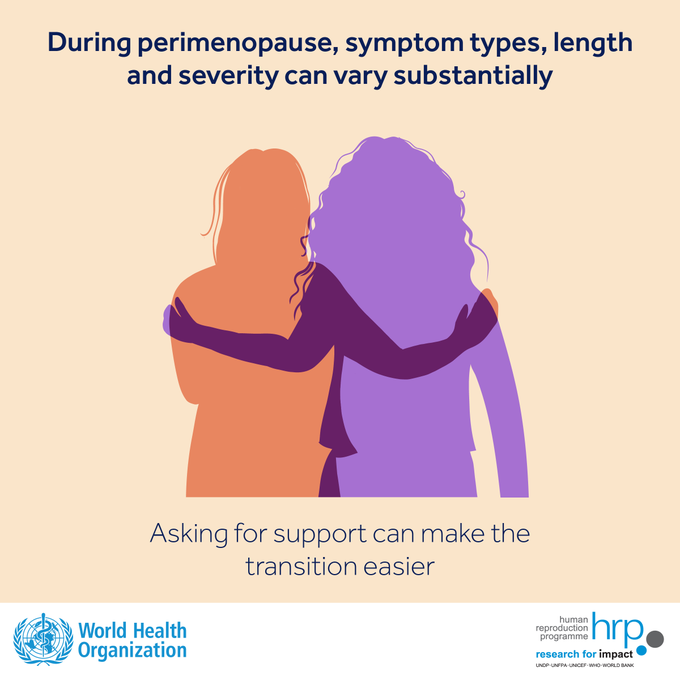
- Menopause Checklist Podcast
- Menopause Checklist Podcast: Episode 2: Bye Bye Periods
- Menopause Home Tests: Do They Work?
- Menopause Map: Downloadable Resources – My Personal Path Print Tools: Questions for Your Health Care Provider

- Menopause Map: Downloadable Resources – My Personal Path Print Tools: Symptom Tracker
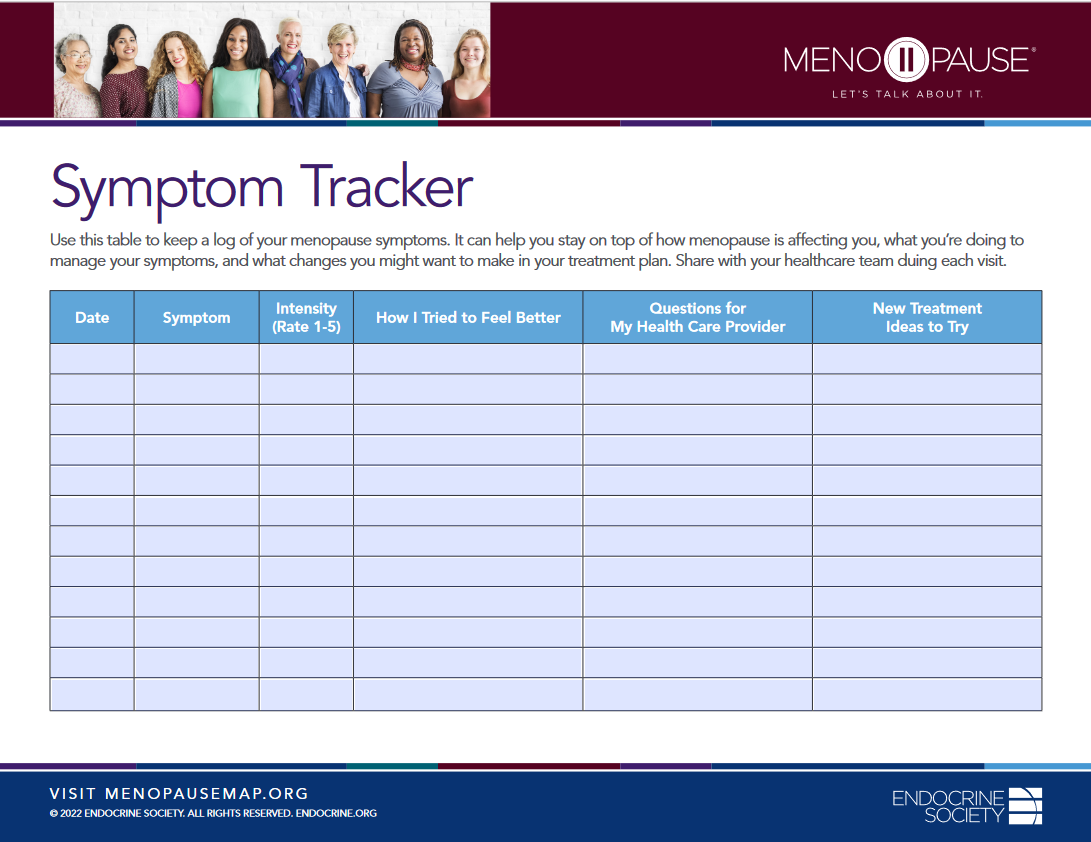
- Menopause Symptoms: Mayo Clinic Expert Outlines Hormone and Nonhormonal Therapies
- Menopause Treatments: What Works, What Doesn’t
- Menopause and Mental Health
- Menopause – Multilingual Facts Sheet
- Menopause: Identification and Management [NICE Guideline]
- Menopause: Identification and Management [NICE Guideline]

- Menopause: Things You Can Do
- Menopause: Your Choice of Language
- Menstrual Calendar
- Mymenoplan.org [My Menoplan, United States]
- My Periods Have Changed. Is Menopause Around the Corner?
- New BMS Tool for Clinicians – Measurement of Serum Estradiol In the Menopause Transition
- Navigating Menopause: Honest Answers To All Your Questions [+ Video: What To Expect in Menopause]
- Navigating Menopause Care Resource Guide
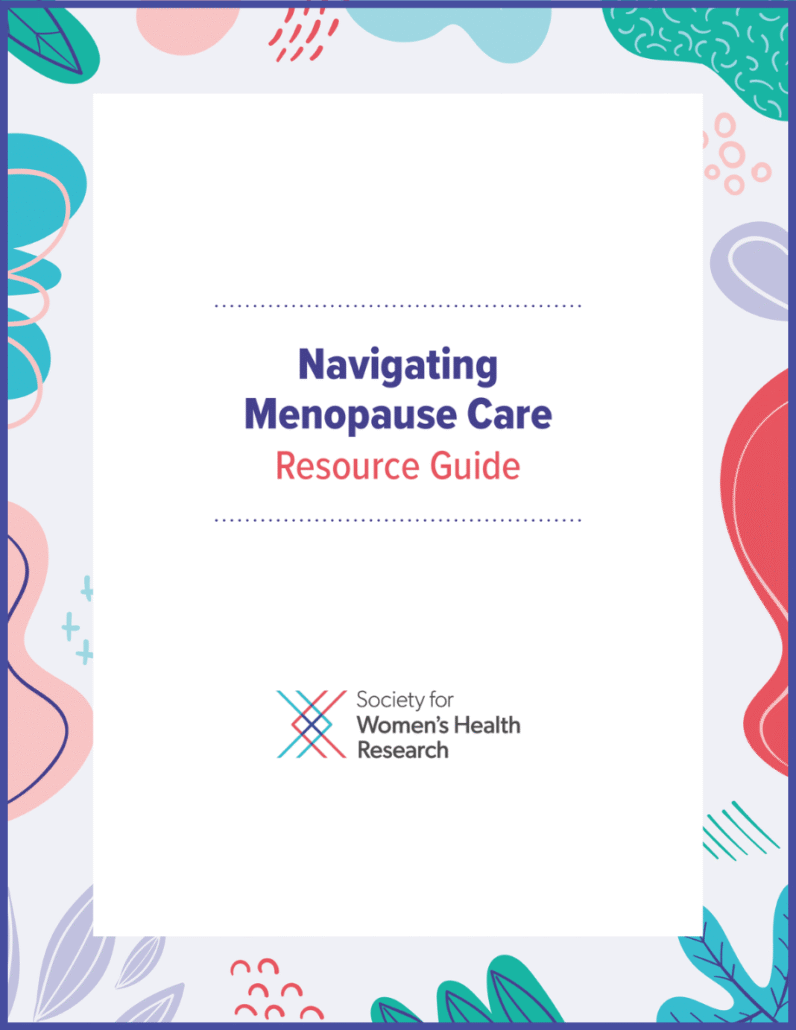
- Night Sweats
- Online Events [International Menopause Society]: CAMS Menopause Hour Webinars – Perimenopause: A Clinical Challenge
- Online Events [International Menopause Society]: IMS Partnership Symposia Series – What’s Hot? Options for Treatment of Hot Flushes 2025
- Online Events [International Menopause Society]: Past Webinars – 2024: Perimenopausal Contraception
- Online Events [International Menopause Society]: Past Webinars – 2025: Lifestyle Medicine
- Online Events [International Menopause Society]: Past Webinars – 2025: The Burn, the Itch, the Pain, the Urge: GSM In Women
- Online Events [International Menopause Society]: Past Webinars – 2025: The Perimenopause Journey: An Adaptive Reproductive Phase
- Nonhormone Treatments for Hot Flashes and Night Sweats
- Perimenopause
- Perimenopause
- Perimenopause
- Perimenopause With Dr. Heather Hirsch
- Perimenopause and Menopause Checklist: Translated Checklists
- Perimenopause and Menopause Symptom Checklist

- Perimenopause or Menopausal Transition: Measuring Hormone Levels In the Menopausal Transition
- Perimenopause, PMS, and PCOS: All About the Period
- Resources: Fact Sheets [Multiply Languages]

- Supplements: What Works, What Doesn’t and the Truth About Menowashing
- The Lancet: Series From the Lancet Journal – Menopause 2024
- The Menopause Society Statement on Misinformation Surrounding Hormone Therapy
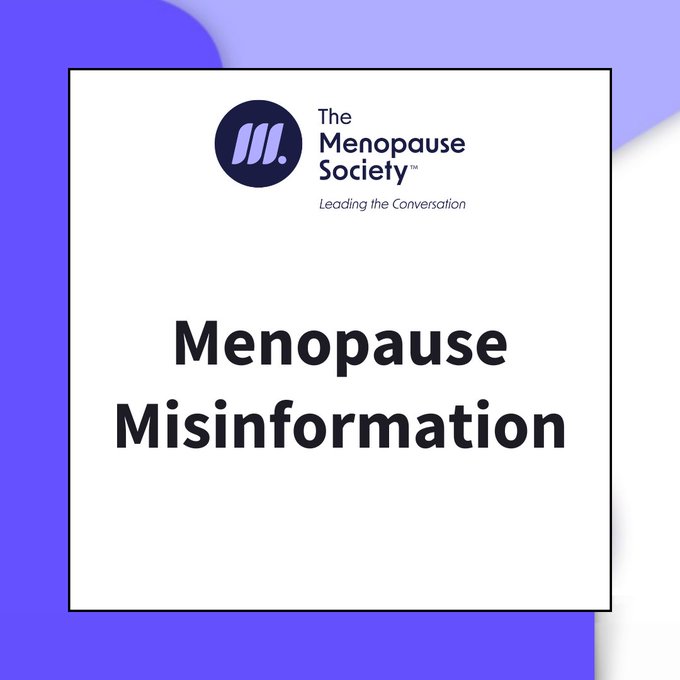
- Tips To Help Manage Menopause Symptoms
- Videos and Podcasts: Videos – Interviews: A Simple Approach To Menopause: The Menopause Quick Six (www.MQ6.ca)
- Websites Selling Direct-to-Consumer Anti-Mullerian Hormone Tests
- What Is the Difference Between Perimenopause, Menopause and Postmenopause?
- What Is Perimenopause and Menopause? Diagnosing Perimenopause and Menopause
- When Does Perimenopause Start and How Do You Define the Beginning
- Why Is FSH Not Needed for Diagnosis of Menopause
Sources
Where may I find the Sources quoted?
You may find the Sources at:
Sources
- Diagnostic Tests for Menopause. 2022:1. European Menopause and Andropause Society https://emas-online.org/wp-content/uploads/2022/05/Diagnostic-tests-for-menopause.pdf Accessed: 17 February 2026
- What Is Perimenopause and Menopause? Diagnosing Perimenopause and Menopause. Last Updated: 03 February 2026 | Last Reviewed: 22 April 2025. Jean Hailes for Women’s Health https://jeanhailes.org.au/health-a-z/menopause/about-menopause/ Accessed: 17 February 2026
- What Is Perimenopause and Menopause? Diagnosing Perimenopause and Menopause: Blood Tests To Diagnose Menopause. Last Updated: 03 February 2026 | Last Reviewed: 22 April 2025. Jean Hailes for Women’s Health https://jeanhailes.org.au/health-a-z/menopause/about-menopause/ Accessed: 17 February 2026
- What Is Menopause? How Is Menopause Diagnosed? 03 May 2022. Australasian Menopause Society https://www.menopause.org.au/hp/information-sheets/what-is-menopause Accessed: 17 February 2026
- Diagnosing Menopause: Symptom Assessment and Diagnosis At Perimenopause and Menopause. Content Created May 2022. Australasian Menopause Society https://www.menopause.org.au/hp/information-sheets/diagnosing-menopause Accessed: 17 February 2026
- Menopause – Diagnosis & Treatment: Diagnosis. 07 August 2024. Mayo Clinic https://www.mayoclinic.org/diseases-conditions/menopause/diagnosis-treatment/drc-20353401 Accessed: 17 February 2026
- What Is Perimenopause and Menopause? Diagnosing Perimenopause and Menopause. Last Updated: 03 February 2026 | Last Reviewed: 22 April 2025. Jean Hailes for Women’s Health https://jeanhailes.org.au/health-a-z/menopause/about-menopause/ Accessed: 17 February 2026
- Diagnostic Tests for Menopause. 2022:1. European Menopause and Andropause Society https://emas-online.org/wp-content/uploads/2022/05/Diagnostic-tests-for-menopause.pdf Accessed: 17 February 2026
- Diagnosing Menopause: Key Points. 03 May 2022. Australasian Menopause Society https://www.menopause.org.au/hp/information-sheets/diagnosing-menopause Accessed: 17 February 2026
- Menopause Definitions: V – Vasomotor Symptoms. Menopause Society https://menopause.org/patient-education/menopause-glossary#V Accessed: 17 February 2026
- Diagnosing Menopause: Symptom Assessment and Diagnosis At Perimenopause and Menopause. Content Created May 2022. Australasian Menopause Society https://www.menopause.org.au/hp/information-sheets/diagnosing-menopause Accessed: 17 February 2026
- Diagnosing Menopause: Symptom Score Sheet. Content Created May 2022. Australasian Menopause Society https://www.menopause.org.au/hp/information-sheets/diagnosing-menopause Accessed: 17 February 2026
- Lambrinoudaki I., Armeni E., Goulis D., Bretz S, Ceausu I, Durmusoglu F, Erkkola R. Fistonic I, Gambacciani M., Geukes M., Hamoda H., Hartley C., Lindén Hirschberg A., Meczekalski B., Mendoza N., Mueck A., Smetnik A., Stute P., van Trotsenburg M., Rees M. Menopause, Wellbeing and Health: A Care Pathway From the European Menopause and Andropause Society: 3. Investigations and Assessment of Ovarian Reserve 3.1 Endocrine Investigations 3.1.1 Follicle-Stimulating Hormone. Published: 12 May 2022:4. https://www.maturitas.org/article/S0378-5122(22)00090-1/fulltext Accessed: 17 February 2026
- What Is Menopause? How Is Menopause Diagnosed? Content Created May 2022. Australasian Menopause Society https://www.menopause.org.au/hp/information-sheets/what-is-menopause Accessed: 17 February 2026
- What Is Perimenopause and Menopause? When To See Your Doctor. Last Updated: 03 February 2026 | Last Reviewed: 22 April 2025. Jean Hailes for Women’s Health https://jeanhailes.org.au/health-a-z/menopause/about-menopause/ Accessed: 17 February 2026







